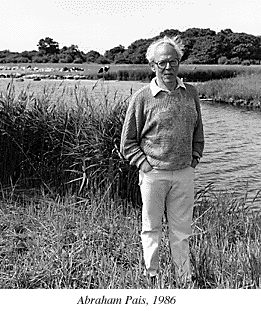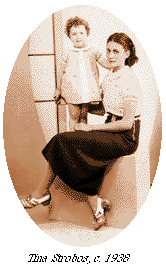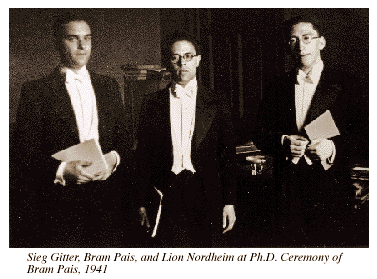BRAM PAIS TELLS HIS STORY

ABRAHAM PAIS was a brilliant physics student at the University of Utrecht when the Nazi's came to power. Managing to finish his Ph.D. just days before Jews were barred altogether from the universities brought him the distinction of being the last Jew to
receive a doctorate degree in wartime Holland. His dissertation attracted the attention of Nils Bohr, who sent a message inviting him to work with him in Denmark. With Tina's help he went underground for the duration of the war, unable to leave Holland to accept Nils Bohr's invitation until 1946. The following year he was a colleague of Einstein at the Princeton Institute for Advanced Study. In 1982 he
published
a critically acclaimed biography of Einstein, in 1986, a definitive history of the study of modern physics, and more recently a biography of Nils Bohr. He is presently a physics professor at Rockefeller University.
ABRAHAM (BRAM) PAIS: There was a family in Amsterdam, three sisters and one brother, who were all very active in one way or another in the Zionist youth organization. Their name was Van Amerongen. That's where I met Tina, in their home, around 1939 or '40. Tineke is not Jewish, but she was a close friend of the youngest of the sisters, Trusha, (Tirtsah), and was also interested in the Zionist movement. I was a physics student; she was beginning to study medicine. We saw a fair amount of each other. She was what you might call my girlfriend.
I knew Tina's mother, Marie, and I knew her grandmother. The grandmother was a fairly well-to-do widow. Her mother was divorced long before I met her. That whole family was simply spectacular!
Tineke was a very beautiful young woman.
 She's still a beautiful woman. She was dark haired, with dark eyes. Her mind is quick, but she talks rather slowly. My father, who was orthodox, was furious that I had a girlfriend who was not Jewish. "Not in my house," he said. Then one day, by chance, Tina and I were walking along the beach and my parents were there. I said to her, "Come on. I will introduce you." They were courteous people, my mother and father. They didn't make any fuss. It ended up that nobody, including myself, loved Tineke more than my father. He just worshipped her. He thought she was so wonderful.
She's still a beautiful woman. She was dark haired, with dark eyes. Her mind is quick, but she talks rather slowly. My father, who was orthodox, was furious that I had a girlfriend who was not Jewish. "Not in my house," he said. Then one day, by chance, Tina and I were walking along the beach and my parents were there. I said to her, "Come on. I will introduce you." They were courteous people, my mother and father. They didn't make any fuss. It ended up that nobody, including myself, loved Tineke more than my father. He just worshipped her. He thought she was so wonderful.
TINA'S FAMILY: Tineke and her mother, Marie, lived in a pleasant house. Tineke was the only child. It was a rambling house with quite a large number of rooms. I would say they were pretty well off. I don't quite know how they came about it, perhaps
through a family inheritance. I wouldn't say there was wealth; they were well off, but they were socialists.
I don't know all the details about the family, but they did a great deal during the war. They gave their own home to so many people coming into hiding. They did not keep people there for a very long time, because they felt they were too exposed, but their
home became a transit place from which people went on to other places.
Tineke was fantastic. Her mother was an absolutely marvelous woman, and so was her grandmother. Her grandmother was one of those early ex-patriots for whom atheism was a religion. She was an old woman when I knew her, a very fat little lady, but with tremendous vigor--a wonderful, wonderful person. They were just a very fine family. I can say that they are among the finest people I've known in my whole life.
Tineke's mother, Marie, was a cheery person, but perhaps a little bit too self-deprecating. She was always doing things for other people. It was sort of natural in that family. She was pretty old, but you know, I was quite young, so every person more than ten years older than me looked archaic to the ultimate.

There was something tireless about Marie. She was tirelessly active on behalf of other people. She was a hospitable person. In times of difficulty she would be running around, doing errands, bringing messages, bringing things to people. There was a certain special quality in her home. It was like a haven. She didn't, as they say in America, make a production out of it. It was a natural thing for her. People would come and she would help them. She was always doing things: she would hide items of value in her cellar, or personal effects that people wanted to keep, which the Germans would have confiscated. I think she was also a little bit restless. She was a woman of deep conviction, but she didn't make speeches. She translated her convictions into actions, without making a fuss about it. Tineke was not a fussy woman either. She just did it. In these respects I think Tineke and her mother had quite a bit in common. Marie and Tineke both had that general sense of helping.
There were
measures against the Jews
almost from the day the Germans marched into Holland, in May 1940, but it was a gradual thing, which was very clever on their part. They didn't immediately start transporting the Jews to camps. They did it step by step by step. The very first rule, in September 1940, I think, was that Jews were no longer allowed to go to the cinema. We said to ourselves, "So what? So we can't see movies anymore." We could live with that. Then there was the next thing, then the next. My memory is that it was the beginning of '42 when we had to wear the star. It was not at the start of the war. Non-Jewish people would come up to you in the street and say something friendly, like "It's terrible that you have to do this," something like that. We had a very small National Socialist (Nazi) organization in Holland, very small.
The fourteenth of June, 1941, was set by the German authorities as the last day Jews were allowed to get a Ph.D in Holland. I was working toward my degree in physics at the University of Utrecht. I told myself, I must get a Ph.D before this date because as soon as the war is over I want to be out of Holland, to study abroad. I think that I was quite certain I would get through the war. On the ninth of June, 1941, I got my degree.
I'm a hard worker, but I hope I never work as hard again as during that time. I spent every night until four in the morning on my dissertation, until I came to the point when I could not write another word, not even the next letter. I went to bed. Eight o'clock the next morning I was up writing again. For weeks I slept four hours a night, trying to finish in time. Anyway, I got through with it. It was printed, as was necessary in those times. It was also the custom to defend your dissertation before the faculty in a formal ceremony, attired in white tie and tails. You had two assistants, called "paranymphs," who were also dressed in white tie and tails. I came in, flanked by my good friends, one of whom was Lion Nordheim. We stood up and the whole senate of the university came in and sat down, to witness the defense of the dissertation. Then I got my degree.

There was a reception, after which we went to Tineke's home to celebrate, where her mother had made a dinner. My parents were there. My sister was there. I think they are all in the picture. I was so tired. Following that, Tineke and I took a vacation together for about two weeks. I was completely exhausted. I've never been so tired. We just went for walks in the country, things like that. She could recite poetry very well. One poem she was fond of began: "They were not the Jews, Jesus, who put you to the cross". It was a medieval Dutch poem, very old. It's typical that that was a poem she would know by heart.
What was so special about these people who did so much for the Jews? What made them do it? It was partly a moral thing. They had incredibly deep convictions. That that poem was important to Tineke says something about her personality.
In December 1940, all Jews who held positions at universities: professors, assistants, lecturers, were dismissed. I was an assistant, a very low, low rank. We had our I.D. cards with the "J" prominently stamped on them. But people who had had positions at the university also got a special stamp which said, "The owner of this particular I.D. card is, until further notice, exempt from being sent for labor." I had the very highest ranking for a stamp of this kind, so I felt fairly safe. Then in early '43 there was an announcement that said, "Since we can no longer guarantee your freedom of movement," because the Germans had begun to pick up Jews to be sent to camps, "we have arranged that all of you will be housed in a chateau near a little village called Barneveld. Be there at such and such a time." So we were to go to Barneveld.

For several years there were no deportations. When that began, I for one, knew that if the Germans were taking the Jews out of The Netherlands, it was going to be really bad. I decided I would never go anywhere where the Germans wanted me. The university
people who went to Barneveld were sent later on to Thieresenstadt, which was a high class concentration camp, and, in fact, most of them did come out of the war.
In the Netherlands we had a difficult situation because the highest German authority was civil, unlike France and Belgium where the highest authority was military. In those countries the main German concern was to keep the roads to the front open, but in Holland the idea from the start was to prepare for the annexation of Holland into the German Reich. A civil authority meant that the highest power in the country was the Gestapo, which was disasterous for the Jews.
HIDING: When they announced the deportation to Barneveld, I talked it over with Tineke and she said, "You will go in hiding." A friend of hers had a big house on one of the canals in Amsterdam where I could go. Then on a certain day, I vanished from the earth. I had been living in my parents' home. They simply told people who asked about me that I had gone to the camp, to Barneveld, but in fact, I had vanished. I was in hiding. Of course Tineke knew where I was; it was not so far from where she lived.
I lived altogether in nine different places while in hiding, because whenever something happened, either someone betrayed the place, or something happened to someone who knew where I was, I had to move. The rule of the game was never assume that anybody,
however honorable, would be able to stand up under torture. If Mr. X, who knew where I was, was caught for some reason, I should move.
I was in that first place for nine months. Then the Gestapo came. I ran to the attic where I had a hiding place between the walls. There was a false piece of wall that you lifted out. Once inside you had to push the piece of wall back in position to make
it look like a regular wall. I had done it so often, but this time I couldn't quite get it back in the right place; it was a little bit off, a little piece was open. At one point this German fellow came searching up there with a flashlight. I could see him, but he couldn't see me. It was unbelievable. I was sitting there, crunched up for three hours.The funny thing was when I came out I had the feeling I had only been there ten minutes. I remember that so well. I had no idea of the time. But then I had to move.
I moved to the house of a psychiatrist in the summer of '44, the summer of the invasion. That whole summer I was inside a small home, never once on the street. But there was no time to go crazy, there was too much work to do. I had big piles of books: I was reading, I was calculating. After I woke up in the morning, I did forty-five minutes of calisthenics, and again before dinner, at around 5 o'clock, I exercised for another forty-five minutes, in front of an open window with the curtains drawn across it. I used two little dumbells. Before going into hiding I had taken exercise and calisthenics classes to learn how to keep fit. I did that as a precaution, because I knew I would be in confinement.
The families I stayed with were pleasant and kind. I have nothing but good memories about them. At the first place I stayed, there were two children, a girl and a boy. Another family had two daughters, one of whom was epileptic. They were people of quite modest means; the father was an office worker and they lived in a very small house.
Now Tineke always knew where I was. She arranged for food coupons. As long as somebody could take the I.D. card to some office or other, you could get ration stamps. Tineke would see to it that I had books to read or to study. She got these from the library or through friends. There was a man who lived near my last hiding place who sent me a long list of all the books he had in his library. I checked off the ones I wanted to read and he would arrange for them to be delivered to me, but not by him. I've never ever read so much as I did then. I read WAR AND PEACE, I read all of Dickens, everything. Also--it's a very strange thing--when you are out of circulation for a long time, the mind comes to the rescue in peculiar kinds of ways. You are capable of reading for entire days.
One of the things I learned, one of the strangest things, is how to think. There was nothing else to do. I couldn't see people, or go for a walk in the forest. All I had was my head and my books, and I thought a lot. I learned, because there was no interruption. I had access to myself, to my thinking. I wouldn't say that I particularly matured. The thinking was physics thinking. I was just short of twenty-two then.
I was in hiding for two years and two months, something like that. In all that time I went out very, very little, just once in a great while, after dark. Once I even took the train to Utrecht, forty miles from Amsterdam, with my yellow star, this star which I still have. Why did I go? I just wanted to visit some friends. I was a little bit crazy, a little bit insane.
 She's still a beautiful woman. She was dark haired, with dark eyes. Her mind is quick, but she talks rather slowly. My father, who was orthodox, was furious that I had a girlfriend who was not Jewish. "Not in my house," he said. Then one day, by chance, Tina and I were walking along the beach and my parents were there. I said to her, "Come on. I will introduce you." They were courteous people, my mother and father. They didn't make any fuss. It ended up that nobody, including myself, loved Tineke more than my father. He just worshipped her. He thought she was so wonderful.
She's still a beautiful woman. She was dark haired, with dark eyes. Her mind is quick, but she talks rather slowly. My father, who was orthodox, was furious that I had a girlfriend who was not Jewish. "Not in my house," he said. Then one day, by chance, Tina and I were walking along the beach and my parents were there. I said to her, "Come on. I will introduce you." They were courteous people, my mother and father. They didn't make any fuss. It ended up that nobody, including myself, loved Tineke more than my father. He just worshipped her. He thought she was so wonderful.



